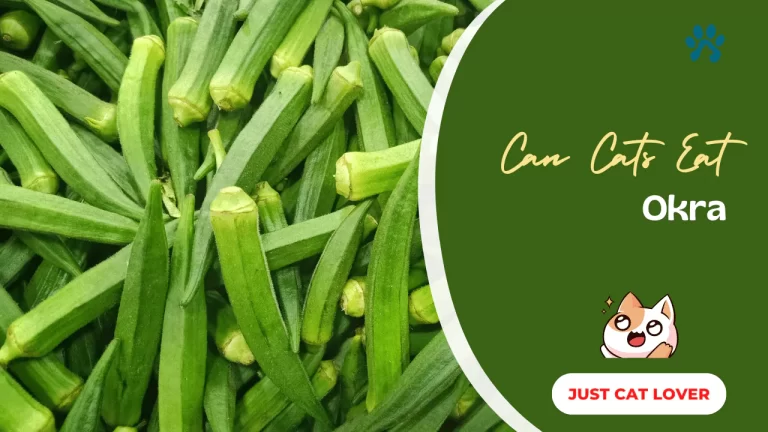Yes, cats can eat okra in moderation. Okra is not toxic to cats and can provide some nutritional benefits. However, okra should only be fed occasionally as a treat. Too much can cause digestive upset.
What is Okra?
Okra, also known as lady’s fingers, is a flowering plant in the mallow family. It is grown for its edible green seed pods. Okra is native to Africa and is commonly used in dishes like gumbo.
The immature, green pods are the part of the okra plant that is typically eaten. Okra pods have a mucilaginous texture and emit a slick liquid when cut. This mucilage acts as a thickening agent in recipes.
Nutritional Value of Okra
Okra is low in calories and contains vitamin C, folate, magnesium, and potassium. Here are some of the nutrients found in 1 cup of raw okra (100 grams):
- Calories: 33
- Protein: 2 grams
- Fiber: 3.2 grams
- Vitamin C: 23% of the Daily Value (DV)
- Vitamin A: 10% of the DV
- Folate: 22% of the DV
- Magnesium: 14% of the DV
- Potassium: 8% of the DV
Okra contains antioxidant compounds called polyphenols which may provide health benefits. It also contains small amounts of other vitamins and minerals.
Is Okra Safe for Cats?
Okra is not toxic to cats. It is safe for them to eat in small amounts as an occasional treat. Both raw and cooked okra are safe options.
Make sure any okra given to cats is fresh. Do not feed cats moldy or rotten okra, as this could cause food poisoning. Always wash okra thoroughly before preparing it for your cat.
It’s best to introduce new foods like okra slowly and in moderation to check for any allergies or digestive upset.
Potential Benefits of Feeding Okra to Cats
The fiber, vitamins, minerals, and antioxidants in okra may provide some benefits for cats if fed occasionally. Here are some potential benefits:
- Supports digestion – The high fiber content in okra can aid digestion in cats. Fiber adds bulk to stool and helps maintain regularity.
- Boosts immunity – Okra contains antioxidant compounds and vitamins like vitamin C which support the immune system. This may help cats fight infections.
- Supports bone health – Okra provides magnesium and calcium which are important minerals for strong, healthy bones.
- Promotes vision health – Vitamin A found in okra helps maintain good vision in cats.
Again, these benefits are only applicable if okra is fed occasionally and in moderation. Feeding too much may cause adverse effects.
Potential Risks of Feeding Okra to Cats
While okra is not toxic for cats, there are some potential downsides to feeding it in large amounts or too frequently:
- Digestive upset – Too much dietary fiber from okra can irritate the digestive tract and cause diarrhea, gas, or bloating.
- Allergic reaction – Some cats may be allergic to okra. Monitor for signs like itching, vomiting, and diarrhea.
- Weight gain – Okra pods can be high in carbohydrates so overfeeding may lead to excess calories and obesity.
- Pesticide exposure – Only feed cats okra grown organically or washed thoroughly to avoid pesticide ingestion.
- Choking hazard – Whole, raw okra pods may present a choking risk for cats. Slice pods into small pieces before feeding.
To prevent adverse effects, limit okra to just a few small pieces 1-2 times per week at most. Discontinue use if any digestive upset or allergic reaction occurs.
How to Feed Okra to Cats?
Here are some tips for safely incorporating okra into a cat’s diet:
- Introduce slowly in tiny amounts mixed with their regular food. Look for signs of digestive upset or allergies.
- Wash okra thoroughly to remove dirt, debris, and pesticide residues. Pat dry before serving.
- Chop okra pods into small, bite-sized pieces to prevent choking. Remove tough stems and seeds which are hard to digest.
- Lightly steam or boil okra to soften it up for easier eating and digestibility. Do not season with onion, garlic, or other spices.
- Mix a few small pieces of okra into canned cat food or add it as a topping to homemade cat food.
- Only give cats a taste of okra pods 1-2 times per week at most. Do not free-feed okra daily.
- Refrigerate unused okra within a couple days and avoid feeding spoiled pods.
In conclusion, it is fine for cats to occasionally eat small amounts of okra as long as it is introduced slowly and proper precautions are taken. While okra can provide some nutritional benefits, too much may cause digestive problems or weight gain in cats. Limit okra to just a few times a week as a treat. Check with your veterinarian if you have any concerns about incorporating okra into your cat’s diet.







